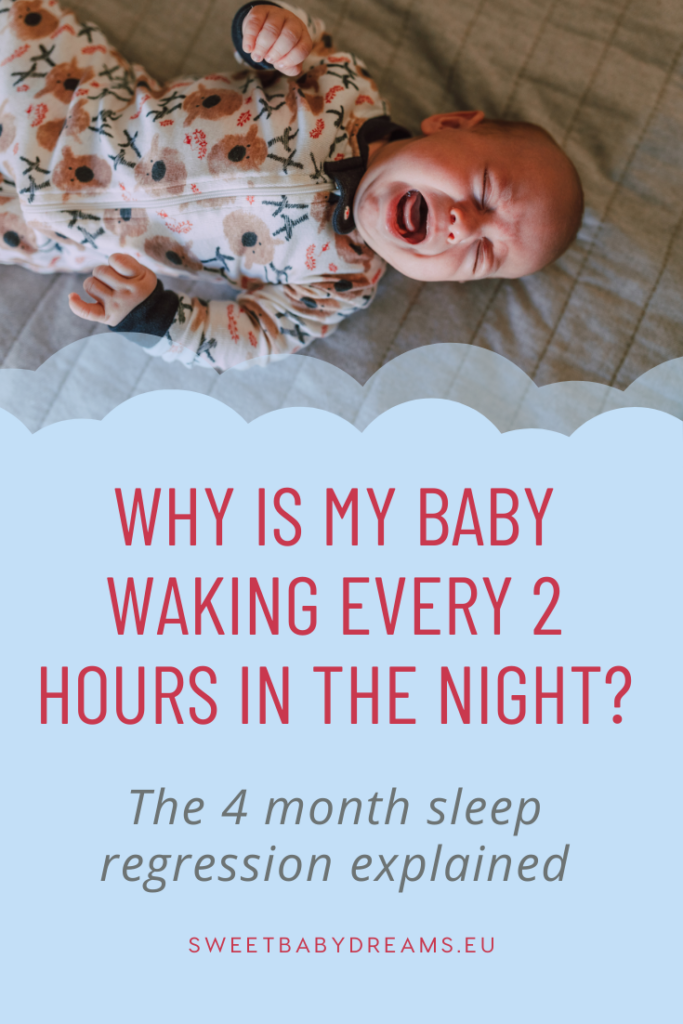Probably one of the most-googled topics of sleep-deprived parents, the “4-month sleep regression” can dramatically change the way your baby has been sleeping. So many parents come to us saying that their little one was sleeping like an angel until 3,5 months and then all of a sudden, they started waking up at least every 2 hours! But why? It’s because they went through the 4 month sleep regression.
First, let’s change the narrative on this regression and instead, call it a “progression”, because that’s what it actually is. It’s a developmental progression that can happen anywhere between 3.5-6 months and it marks a permanent change in your baby’s sleep patterns.

What is newborn sleep like?
As a full-term newborn, your little one’s sleep is defined by 2 stages: active sleep (REM-like and makes up 50% of their sleep!) and quiet sleep (non-REM-like-sleep). Plus, there’s indeterminate sleep, which is simply the transition between active and quiet sleep.
When newborns fall asleep, they go right into active sleep and you’ve probably noticed them moving quite a bit (sucking motions, smiles, frowns, irregular breathing and gross limb movements, even opening and closing their eyes) as well as making noises (grunting, whining, short spurts of crying). After a while, they “calm down” and go into deep sleep. At this stage, it can be very hard to wake your baby (as any mom who’s tried to wake a baby for a feed knows).
As your baby matures, so do their sleep cycles and non-REM sleep stages begin to emerge. This is what happens during the 4 month sleep regression. (INSERT GRAPHIC)
How does the 4 months sleep regression affect sleep?
Firstly, one big change that happens after this progression is that babies no longer enter sleep through active sleep (like a newborn) but through the lightest stage of non-REM sleep (like an adult) and then it takes a few minutes for them to move into deep sleep .
Secondly, due to the development of 3 distinct non-REM stages your little one will actually cycle through the light sleep stage more frequently through the night after the 4 month sleep regression.
This can often result in more frequent night wakings (often 1-2 hours as the sleep cycles are anywhere between 70-120 minutes long), especially for little ones that have a lot of help falling asleep at bedtime (for example fed or rocked to sleep, or using the pacifier to settle.. If a baby falls asleep with a lot of parental support, that’s the same help that they will expect throughout the night whenever they wake and struggle to settle again (and even in the middle of their nap).
Nursing or feeding to sleep, rocking, bouncing, or offering the pacifier are all sleep props and while they may be helpful and necessary during the newborn stage, they often become ingrained sleep associations by the time the 4 month sleep regression rolls around, wreaking havoc on your baby’s sleep. This is where starting to wean off those unhelpful sleep associations can really help- the more independently your little one is able to settle at the beginning of the night, the more easily they will resettle in the middle of the night as well! If you don’t know how to go about doing that, book a 20-minute free call with us to see how we can help.
How do I know my baby has gone through the 4 month sleep regression?
The biggest indicator is simply the duration of their sleep cycles: they will often begin to wake after exactly 40-45 minutes at naptime, and night sleep will often deterioriate – a baby that used to wake only every 3-4 hours will begin to wake every 1-2 hours.. If this notable change is consistent for more than 1 week and your baby is between 3.5-6 months, it’s pretty safe to say they’ve gone through this developmental milestone.
Also, there’s really no going “through it” as it actually never ends. The changes to sleep that happen during this development are permanent. However, if your little one was sleeping great before and needed minimal help (if any) to fall asleep, it could be that their sleep will only temporarily be affected and will improve over 2-3 weeks on its own. On the other hand, if your baby has a strong sleep association that they rely on for falling asleep and connect their sleep cycles, such as nursing to sleep or being rocked to sleep, this may only be the start of your sleepless nights.
How can I support my baby’s sleep during/after the 4 month sleep progression?
Since your baby now moves through light sleep to enter deep sleep, and goes through lighter sleep phases more frequently in the night, you can imagine that how they’re falling asleep is more important than it was in the newborn phase. Your baby’s sleep environment, day rhythm, nutrition, sleep associations and how they’re falling asleep are all pieces of the puzzle to encourage good sleep. You can choose to make some changes to a couple of the pieces, like optimizing the sleep space or introducing a day rhythm and see how that improves sleep, or work on the whole puzzle together.
If your baby is going through or has gone through the 4-month sleep regression and you’re feeling like there’s not enough coffee in the world to get you through your day, take a look at our Ultimate Baby & Toddler Sleep course for ages 4-24 months. This course will give you all the informations and practical tools you need to get your little one sleeping through the night or with minimal night feeds (as they are able to).
